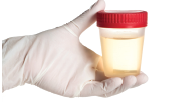This 26-week randomized, placebo-controlled trial investigated the effects of 200 mg ubiquinol (a reduced form of coenzyme Q10) daily on semen parameters in infertile men with idiopathic oligoasthenoteratozoospermia (N=228). After completion of the 26- week treatment phase, participants were followed for another 12-week off-drug period. Upon completion of the treatment period, sperm density in the ubiquinol and placebo groups was 28.7 × 10(6)/ml and 16.8 × 10(6)/ml (P = 0.005), sperm motility was 35.8% and 25.4% (P = 0.008), and sperm strict morphology was 17.6% and 14.8% (P = 0.01) of normal sperm, respectively. Serum follicle-stimulating hormone levels decreased (P = 0.02) and serum inhibin B concentrations increased (P = 0.01) during the treatment period. Although semen parameters gradually returned to baseline values during the offdrug period, differences remained significant for sperm density (P = 0.03) and sperm motility (P = 0.03). A positive association was found between the duration of treatment with ubiquinol and sperm density (r = 0.74, P = 0.017), sperm motility (r = 0.66, P = 0.024), and sperm morphology (r = 0.57, P = 0.027). Therefore, ubiquinol was effective for improving sperm parameters in men with unexplained oligoasthenoteratozoospermia. J Urol. 2012 Aug;188(2):526-31. PMID: 22704112









